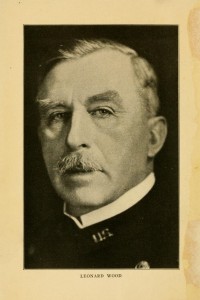 Leonard Wood (October 9, 1860 – August 7, 1927) was a physician who served as the Chief of Staff of the United States Army, Military Governor of Cuba, and Governor General of the Philippines. Early in his military career, he received the Medal of Honor. Wood also holds officer service #2 in the Regular Army (John Pershing holds officer service #1). He was present at the 1906 First Battle of Bud Dajo.
Leonard Wood (October 9, 1860 – August 7, 1927) was a physician who served as the Chief of Staff of the United States Army, Military Governor of Cuba, and Governor General of the Philippines. Early in his military career, he received the Medal of Honor. Wood also holds officer service #2 in the Regular Army (John Pershing holds officer service #1). He was present at the 1906 First Battle of Bud Dajo.
Early life and career.
Born in Winchester, New Hampshire to Charles Jewett Wood (1829-1880) and Caroline E. (Hagar) Wood (1836-1910), he attended Pierce Academy in Middleborough, Massachusetts and Harvard Medical School, earning an M.D. degree in 1884 as an intern at Boston City Hospital. Leonard Wood was of English descent, and was descended from four Mayflower passengers including William White, Francis Cooke, Stephen Hopkins and Richard Warren; all four of whom signed the Mayflower Compact. He was married to Louise Adriana Condit Smith (1869-1943), of Washington, on November 18, 1890.
Spanish-American War
Wood was personal physician to Presidents Grover Cleveland and William McKinley through 1898. It was during this period he developed a friendship with Theodore Roosevelt, then Assistant Secretary of the Navy. At the outbreak of the Spanish-American War, Wood, with Roosevelt, organized the 1st Volunteer Cavalry regiment, popularly known as the Rough Riders. Wood commanded the regiment in a successful engagement known as the Battle of Las Guasimas. When the brigade commander, Samuel B. M. Young, became ill, Wood received a field promotion to brigadier general of volunteers and assumed command of the 2nd Brigade, Cavalry Division, Fifth Army Corps (which included the Rough Riders) and led the brigade to a famous victory at Kettle Hill and San Juan Heights.
After San Juan, Wood led the 2nd Cavalry Brigade for the rest of the war; he stayed in Cuba after the war and was appointed the Military Governor of Santiago in 1898, and of Cuba from 1899–1902. In that capacity, he relied on his medical experience to institute improvements to the medical and sanitary conditions in Cuba. He introduced numerous reforms similar to those of the Progressive Movement in the U.S. He was promoted to brigadier general of regulars shortly before moving to his next assignment.
Maj. Gen. Leonard Wood in later years.
In 1914, Wood was replaced as Chief of Staff by William Wotherspoon. Wood was a strong advocate of the Preparedness Movement, led by Republicans, which alienated him from President Wilson. In 1915, he published The Military Obligation of Citizenship.
Wood was an unsuccessful candidate for the Republican presidential nomination in the election of 1920. He was urged into running by the family and supporters of his old friend Theodore Roosevelt, who himself had been considering another campaign before his illness and death in 1919. He won the New Hampshire primary that year but lost at the convention.
He retired from the Army in 1921, and was made Governor General of the Philippines, in which capacity he served from 1921 to 1927.
Wood died in Boston, Massachusetts after undergoing surgery for a recurrent brain tumor. He had initially been diagnosed in 1910 with a benign meningioma brought on by exposure to experimental weapons refuse. This was resected by Harvey Cushing at that time, and Wood made a full recovery until the tumor later recurred. The successful removal of Wood’s brain tumor represented an important milestone, indicating to the public the advances that had been made in the nascent field of neurosurgery, and extending Wood’s life by almost two decades.
He is buried in Arlington National Cemetery. His brain is held at the Yale University School of Medicine as part of an historic collection of Harvey Cushing’s patients’ preserved brains.
Legacy.
Wood’s field jacket from the Spanish American War seen in above photo—on display at the National Museum of American History.
Camp Leonard Wood in Missouri, now Fort Leonard Wood, home of the United States Army Combat Engineer School, Chemical School, and Military Police School, were named in his honor. Ft. Leonard Wood is also a major TRADOC post for Basic Combat Training (BCT), home of the 10th Infantry Regiment ( Basic Training).
One of the US Navy’s Harris-class attack transports, the USS Leonard Wood (APA-12), bears Gen. Wood’s name.
Leonard Wood Road in Baguio City, Philippines was named in his honor. A Public Elementary School in Barangay Jagobiao, Mandaue City, Philippines (inside Eversley Childs Sanitarium compound) was also named after him.
Wood Street corner Gov. Lim Avenue in Zamboanga City, Philippines was also named in his nobility.
He is portrayed favorably in the 1997 miniseries Rough Riders by actor and former United States Marine Dale Dye.
Leonard Wood was portrayed in a less favorable light by Mark Twain and others for his part in the First Battle of Bud Dajo in 1906.
A plaque in Wood’s memory is found in Harvard University’s Memorial Church.
Leonard Wood Avenue; located at Fort Meade, Maryland.
On March 11, 2012, in an interview on the television program Fox News Sunday, presidential candidate Newt Gingrich said of his opponent Mitt Romney, “The fact is that Romney is probably the weakest Republican frontrunner since Leonard Wood in 1920, and Wood ultimately lost on the 10th ballot.”
Agencies/Various/InternetPhotos/YouTube/TheCubanHistory.com
The Cuban History, Hollywood.
Arnoldo Varona, Editor.




